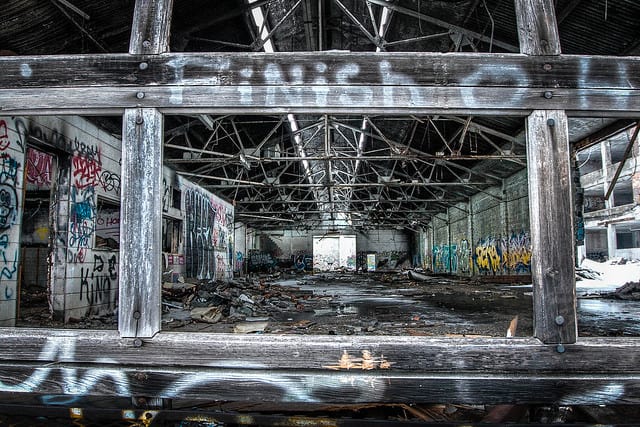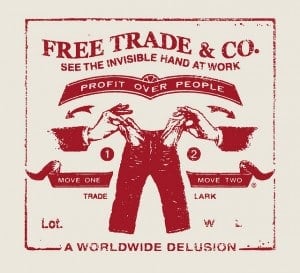Perhaps you don’t remember it from President Obama’s State of the Union Address: at one point during the speech, the majority of the Republicans stood up and cheered while most Democrats sat and glared at both the president and their colleagues across the aisle. This occurred as President Obama called for trade promotion authority. And if you’re anything like me, you were so surprised by the clapping anomaly that you forgot to look into what on earth he was talking actually about. Turns out, President Obama was asking for special permission to pursue something called the “Trans-Pacific Partnership” or “TPP.”
On its surface, this Partnership is simply a proposed free trade agreement between twelve nations: Australia, Brunei, Canada, Chile, Japan, Malaysia, Mexico, New Zealand, Peru, Singapore, Vietnam, and the United States. Digging deeper, however, I discovered that the TPP has incredibly broad and dangerous implications. The more I learned about the Partnership, the more I realized that Christian faith calls us to stand against this massive trade deal.
***
American proponents of the Trans-Pacific Partnership argue that it will create jobs, cement the United States’ role in Asia, and foster labor and environmental protections. In a statement to the TPP organizing body, President Obama said that the deal “means more trade, more good jobs, and higher incomes for people throughout the region, including the United States.” 1 The trade deal will indeed add some jobs and accomplish some of these other goals. The question is, do the human and environmental costs of this trade deal outweigh the benefits? I believe so.
Many people have voiced concern over the Partnership because of the severe lack of transparency in determining what the TPP will actually say. Participating countries are debating the deal under a shroud of secrecy. At present, most information we have on the actual text of the TPP comes from WikiLeaks. Over 600 corporate partners have access to and influence over the talks, but labor, environmental, and human rights advocates are forced to the sidelines.
Opponents also worry about President Obama’s request for fast track authority. This authority curtails Congress’s right to the debate or amend the treaty. Whereas almost all international pacts appear before Congress for debate, fast track requires a yes-or-no vote without debate, pushing TPP through the legislative branch with no opportunity for modification. In other words, fast track further limits input from many of those the agreement will affect.
Organized labor and environmental groups oppose the Trans-Pacific Partnership for more specific reasons as well. The leaked chapter on labor in the TPP contains weak language and unenforceable regulations. The chapter may simply be lip service to assuage fears of those worried about labor justice. A commentary by the AFL-CIO has stated that such a trade agreement accelerates the push to the bottom. The agreement does little to encourage worker protections, development, or fighting poverty, but primarily seeks to increase profits for multinational corporations.
Likewise, there are environmental ramifications to the proposed treaty. Though the United States seeks a framework to battle illegal forestry, overfishing, and other threats to the planet, other countries seem determined to keep such protections out of the final treaty. Advocates have raised concerns about climate change. Under the TPP, corporations could sue countries for creating significant barriers to trade, such as limits on exports of certain carbon fuels. Thus the TPP seems to move away from, rather than toward, meaningful global action on climate change. Additionally, the TPP would create a framework where companies could sue to stop a climate treaty, claiming it impedes their right to profits.
These lawsuits are not without precedent. Under the treaties of several free trade acts, corporations may bring lawsuits against countries they feel are threatening profits. The mining group Pacific Rim filed a $77 million lawsuit against El Salvador for attempting to protect water resources. Since 1987, companies have brought 568 of these lawsuits against governments. Of these cases, 73% were leveled against undeveloped and developing nations; 85% of suits were filed by companies of developed nations. 2 Such legal actions may prevent poorer countries from protecting their people and resources from plundering by wealthier actors.
***
I care deeply about labor concerns and climate action. But they are not the heart of why this trade deal worries me. Free trade deals overwhelmingly affect the poor and marginalized, yet they have the least voice in the process. The tradition of Catholic Social Teaching emphasizes the preferential option for the poor. When making choices, we must first consult and consider how they will impact the marginalized.
The United States Conference of Catholic Bishops has placed before Congress questions of care for our least sisters and brothers. Six days after President Obama’s State of the Union Address, the USCCB Committee on International Justice and Peace sent a letter to welcome the new Congress. In it, the committee outlines eight major areas to consider when completing trade negotiations: labor protection, care for indigenous peoples, migration, agriculture, sustainable development and care for creation, intellectual property rights, dispute resolution, and participation.
At the beating heart of all eight issues is care for the poor and most vulnerable. Do the repercussions of trade agreements displace the poor from work? Do we destroy indigenous cultures for the sake of trade? Do imbalanced agricultural advantages skyrocket the price of food? Do we balance intellectual property rights with considerations of the common good?
In his apostolic exhortation Evangelii Gaudium, Pope Francis stated, “The world wide crisis affecting finance and the economy lays bare their imbalances and, above all, their lack of real concern for human beings; man is reduced to one of his needs alone: consumption.” 3 The Trans-Pacific Partnership further reduces humanity to consumption. It reduces the poor to whatever labor and resources we can extract from them.
We must listen to the poor and their considerations, particularly as they relate to the eight areas laid out by the US bishops. The Trans-Pacific Partnership ignores the voice of the poor. By pushing for secrecy and fast track, most citizens cannot use their governments to voice concerns. This lack of voice particularly hampers the poor. What’s more, by the use of investor-state dispute settlements, the poor cannot control their own resources.
The poor find themselves not only excluded from the economy, but from the very governments meant to represent them. In Caritas in Veritate, Pope Benedict says, “In our own day, the State finds itself having to address the limitations to its sovereignty imposed by the new context of international trade and finance, which is characterized by increasing mobility both of financial capital and means of production, material and immaterial.” 4 Free trade agreements remove the last vestiges of power from the poor and the possibility of seeking recompense through their governments.
Like the U.S. bishops, I am not opposed to trade agreements. I support the exchange of ideas, knowledge, and resources so that we might develop a more just world. Yet based on what we know of the Trans-Pacific Partnership, it is not a socially just or socially conscious trade agreement. Rather than open trade and increase opportunities for those most in need, the poor will again find themselves relegated to the dregs of the global economic system – cogs in the wheel of structures that need them – but fail to truly benefit them.
The Trans-Pacific Partnership stands to affect millions of people around the world. The benefits, however, will only reach a few of them. The stakes are too grave for Christians to sit idly and watch the TPP unfold. Faith in Christ calls disciples to participate in the world, to care for the least of our sisters and brothers. May we be moved by their voices to stand up against the Trans-Pacific Partnership.
- https://templatelab.com/north-american-free-trade-agreement/ ↩
- http://unctad.org/en/PublicationsLibrary/webdiaepcb2014d3_en.pdf ↩
- Evangelii Gaudium, Pope Francis, §55. ↩
- Caritas in Veritate, Pope Emeritus Benedict XVI, §24. ↩




